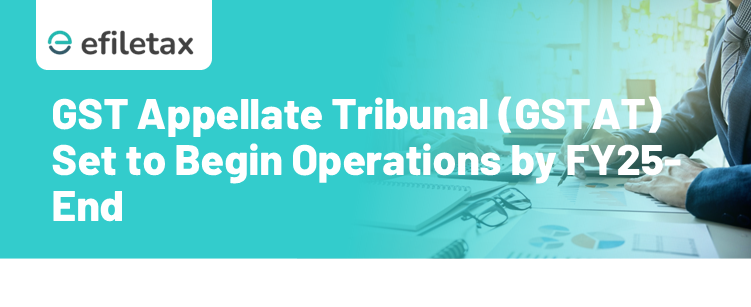
The long-awaited Goods and Services Tax Appellate Tribunal (GSTAT), a specialised body to handle GST-related disputes, is nearing operationalisation. Revenue Secretary Sanjay Malhotra announced during the SBI Annual Business and Economic Conclave that GSTAT is in its final stages of setup and will begin functioning by the end of this financial year (FY25).
This move is expected to bring much-needed relief to taxpayers and businesses facing unresolved GST disputes, with over 14,000 appeals pending as of August 2023.
Key Highlights of GSTAT
| Aspect | Details |
|---|---|
| Purpose | Resolving GST-related disputes by hearing appeals against decisions of the first appellate authority. |
| Structure | Principal Bench in New Delhi and 44 state benches across the country. |
| Members per Bench | Four members: Three from the central government and one from the state government. |
| Digital Operations | Fully electronic, paperless setup. |
| Current Status | Member selection, staff recruitment, and IT infrastructure procurement underway. |
GSTAT: A Step Towards Streamlined GST Dispute Resolution
The GSTAT will provide a streamlined, unified platform to address GST-related disputes. Here’s why this development matters:
- Reduction in Pending Appeals:
Over 14,000 GST appeals were pending as of August 2023, according to a parliamentary panel response. GSTAT will expedite resolutions, reducing delays significantly. - Nationwide Accessibility:
With 44 benches planned across India, taxpayers and businesses will have easier access to appellate authorities, reducing logistical and operational challenges. - Enhanced Efficiency:
A paperless and fully electronic operation, enabled by ready-to-use software, will enhance efficiency and reduce administrative burdens.
Current Progress and Challenges
1. Appointment of Members and Staff
- Interviews for members are complete, with 50% of locations identified for GSTAT benches.
- Recruitment of support staff is ongoing, with advertised positions receiving applications.
2. IT Infrastructure and Operations
- While the software for GSTAT is ready, the necessary IT infrastructure is yet to be procured. This delay could impact the tribunal’s operational timeline.
3. Space Allocation
- For remaining bench locations, space is yet to be secured. This step is critical for ensuring GSTAT’s smooth functioning nationwide.
Legal Framework and Case Laws
The establishment of GSTAT aligns with the principles of fair dispute resolution as upheld in key rulings:
- Union of India vs. Mohit Minerals (2022): Reinforced the importance of appellate tribunals in ensuring balanced adjudication.
- National Small Industries Corp. Ltd. vs. Union of India (2021): Highlighted the need for timely establishment of tribunals to address taxpayers’ grievances effectively.
These cases underscore the legal necessity of GSTAT for timely and fair resolution of GST disputes.
Implications for Taxpayers and Businesses
The operationalisation of GSTAT will have significant benefits:
- Faster Resolutions: Businesses can expect quicker dispute resolutions, reducing financial uncertainties.
- Nationwide Coverage: Improved access to appellate services with 44 benches distributed across states.
- Ease of Compliance: A digital-first approach will simplify documentation and filing processes.
Conclusion:
The Goods and Services Tax Appellate Tribunal (GSTAT) is a crucial addition to India’s tax framework, addressing long-pending GST disputes with transparency and efficiency. With its paperless operations, nationwide presence, and structured approach, GSTAT promises to be a game-changer for taxpayers and businesses.
“Timely justice for taxpayers is the cornerstone of a robust tax ecosystem.”